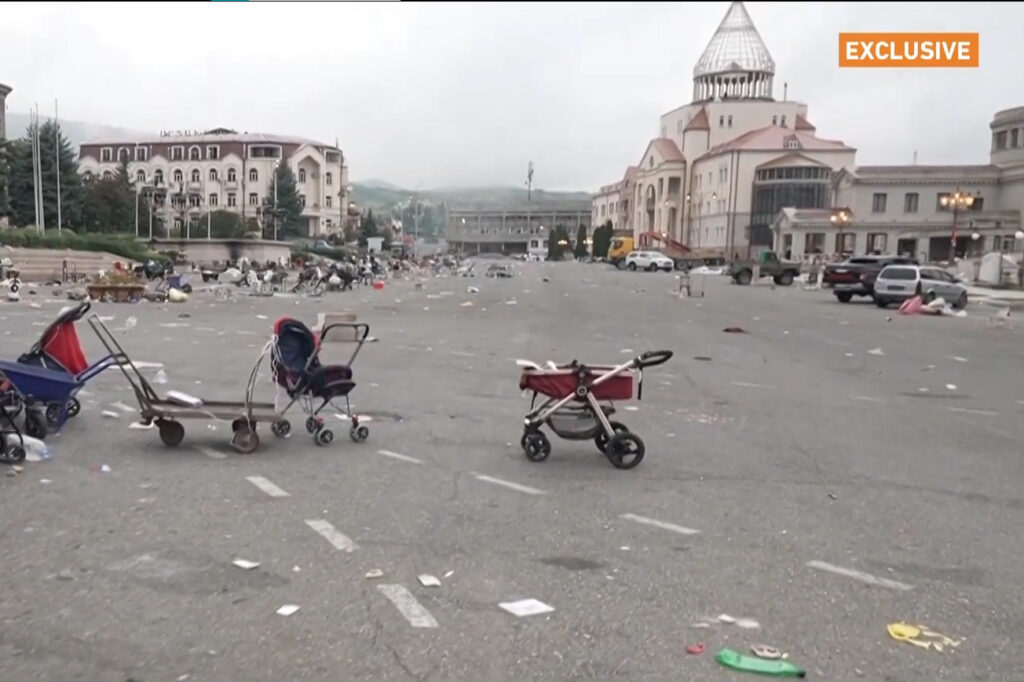A UN mission has arrived in Nagorno-Karabakh to monitor the humanitarian situation, after most of the region’s population fled to Armenia.
On Sunday, Nagorno-Karabakh’s Human Rights Defender, Gegham Stepanyan, said that the last government-provided bus from Nagorno-Karabakh had arrived in Goris, Armenia, with 15 passengers.
Just over a week after Nagorno-Karabakh surrendered to Azerbaijan, over 100,000 have left. It remains unclear how many, if any, of the population has remained; official estimates before the war put the population at around 120,000. Reporting from the regional capital, Stepanakert, Al Jazeera described a ‘ghost town’ with no one left.
Stepanyan said a team had gone door-to-door to help evacuate individuals who needed assistance, and added that anyone with information about isolated or vulnerable people remaining in Nagorno-Karabakh could contact the International Committee of the Red Cross.
As the last bus departed on Sunday, a UN monitoring mission arrived in Nagorno-Karabakh. The mission’s stated aim is to familiarise themselves with the situation on the ground and determine the humanitarian needs of the region’s residents.

The mission has been met with derision in Armenia.
‘At most a few hundred people [remain], who are also leaving’, wrote former State Minister of Nagorno-Karabakh Artak Beglaryan. ‘Are international observers going to check how the rights & security of the animals are protected by the Aliyev genocidal regime? With strong international guarantees people will return to their homes’.
Almost all those who have left Nagorno-Karabakh have travelled to Armenia, leaving the country grappling with an unprecedented influx of refugees.
On Saturday, Armenian Prime Minister Nikol Pashinyan announced that every refugee from Nagorno-Karabakh, regardless of age, would be provided with a monthly stipend of ֏50,000 ($125) for at least the next six months. They would also be provided with a one-time payment of ֏100,000 ($250), he said.
Talks continue
Despite almost no one remaining, Azerbaijani officials have continued to meet with officials from Nagorno-Karabakh. Following a meeting on Monday, the Azerbaijani Presidential Administration said the Azerbaijani government had ‘started practical activities related to the reintegration of Armenian residents living in the Karabakh region.’
This included a number of economic measures, including tax breaks and subsidies for the region. They said security would be provided by the Azerbaijani interior ministry, adding that local residents could join the body.
They said that ‘citizenship issues’ were being resolved ‘in accordance with the Constitution and legislation of the Republic of Azerbaijan’. The ethnic Armenian population of Nagorno-Karabakh have Armenian citizenship, while Azerbaijan does not recognise dual nationality. Azerbaijani state media has claimed that some residents of the region had begun registering for Azerbaijani citizenship, though some from the region have cast doubt on this.
The Presidential Administration said the region would be administered through municipalities which would be formed through elections. International observers and rights groups have frequently observed that elections in Azerbaijan are not free or fair.
The presidential administration also said that ‘the right of residents to protect and develop their culture’ would be ensured. Azerbaijani authorities have for years insisted that Armenian cultural sites in Nagorno-Karabakh were in fact of Caucasian Albanian origin.
‘Contacts with representatives of Armenian residents regarding the practical implementation of reintegration will be continued’, they concluded.
Arrests and explosives
Since the exodus of the region’s population began, Azerbaijan has arrested at least three former Nagorno-Karabakh officials and two military commanders.
Davit Manukyan and Levon Mnatsakanyan, the former deputy commander and the former commander of Nagorno-Karabakh’s army, were arrested on Wednesday and Friday. The former Foreign Minister, Davit Babayan, former Defence Minister, Levan Mnatsakanyan, and former State Minister, Ruben Vardanyan, were arrested earlier.

[Read more: Former Nagorno-Karabakh State Minister Ruben Vardanyan detained by Azerbaijan]
Babayan, who also served as an advisor to Nagorno-Karabakh’s president, announced on Thursday that he would go to Shusha (Shushi) to hand himself in.
Speaking on Sunday, Azerbaijan’s Prosecutor General Kamran Aliyev told journalists that Azerbaijan was searching for ‘more than 300 Armenian separatists accused of committing serious crimes’, including former president Arayik Harutyunyan, and former military commander Jalal Harutyunyan.
Other Nagorno-Karabakh officials have successfully reached Armenia, with former State Minister Artak Beglaryan announcing on Sunday that he had arrived in Yerevan. Samvel Babayan, a former secretary of the National Security Council, arrived in Armenia on 25 September.
Nagorno-Karabakh state communications agency announced on Sunday that President Samvel Shahramanyan would remain in Stepanakert along with a number of officials until search and rescue operations for those killed in the recent fighting, as well as the explosion of a fuel depot, were completed.
On Sunday, Azerbaijan’s Interior Ministry reported that administrative buildings in Stepanakert had been booby-trapped with explosive devices.
In recent days, military tension between Armenia and Azerbaijan has also risen. On Saturday, Azerbaijan reported that an Azerbaijani soldier was killed by sniper fire from an Armenian position in Basarkecher District, a claim Armenia has denied.
On Monday, Armenia’s Defence Ministry in turn stated that Azerbaijani armed forces had opened fire on a vehicle delivering food for Armenian military personnel near Kut, Gegharhunik Province. Azerbaijan denied the attack.
For ease of reading, we choose not to use qualifiers such as ‘de facto’, ‘unrecognised’, or ‘partially recognised’ when discussing institutions or political positions within Abkhazia, Nagorno-Karabakh, and South Ossetia. This does not imply a position on their status.




 2 October 2023
2 October 2023



